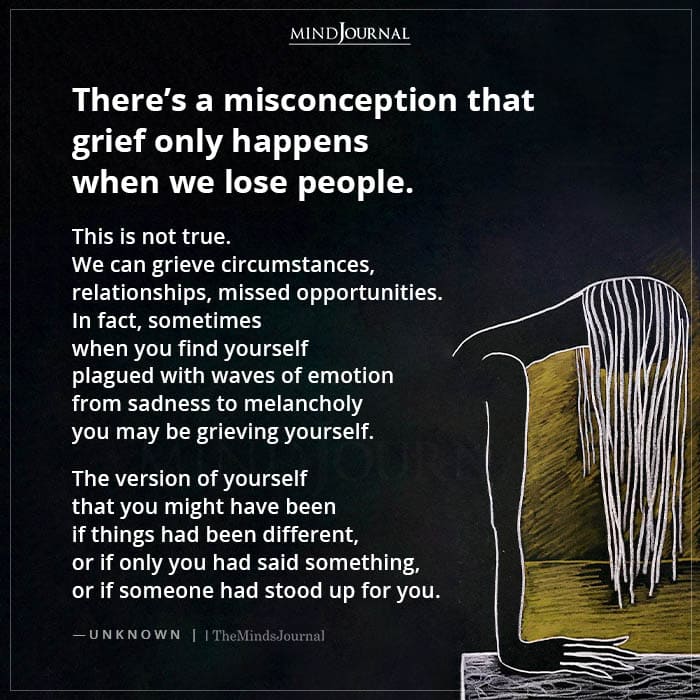Have you ever experienced ambiguous grief in your life? Ambiguous grief is like missing someone without saying goodbye. It’s a confusing time because things aren’t clear, but it’s also a chance to become stronger.
By facing this unclear sadness, we can learn a lot about ourselves and find new ways to heal. Let’s explore what is ambiguous grief and the how to heal from ambiguous grief.
What is Ambiguous Grief?
Pauline Boss originally defined the term ‘ambiguous loss’ as loss that occurs without closure or understanding.
This type of grieving often occurs when a person has lost a loved one due to estrangement, an unexpected relationship ending, abandonment, or adoption, to offer a few examples.
I feel it’s important to address and spread awareness about this topic because it’s not commonly known, yet it’s something so many of us will experience.
Ambiguous grief is often misdiagnosed as depression, but the difference between depression and grief is one is a mental condition, and the other is a heavy emotion being experienced.
Awareness is everything and will help those experiencing this type of pain navigate it so they can move into a healthier and more joyous space. With knowledge comes empowerment.
Related: Behind The Veil Of Grief
How to Heal Ambiguous Grief
1. Name It
Understanding the emotions you are feeling and why, or in other words, putting a name to it, can help tremendously. Often, just having clarity and understanding around your heavy emotions can begin the healing process.
People will often avoid moving past the emotions that come with this type of grieving because it doesn’t follow the same process as when we have lost someone to the permeance of death.
The loss of someone still alive can keep us holding on to hope that prevents us from letting go and moving forward. It’s an anchor to a past that doesn’t exist any longer. Anytime our focus is faced backward, resistance will be felt; in this case, it will usually present as sadness.
2. Acceptance Surrender & Faith
It really all comes down to three things if you genuinely want to move past the heaviness of ambiguous grief. Those three things are the same things I talk about repeatedly in my work: acceptance, surrender, and faith.
Our ego mind is always wanting an answer to why things have happened, and when that answer lies outside of our reach or simply isn’t there at all, it can become a dark hole of sadness that takes us over.
We must be willing to move forward without the answers because it is the most loving thing we can do for ourselves.
You can spend your entire life wracking your brain trying to figure out why something has happened as it has, but the harsh truth is, those answers may never come. The acceptance piece comes in when you learn to be okay with that.
Leaning into the faith that all things unfold in perfection even when you can’t understand the why is one of the most potent mindsets you can adopt if you are experiencing this type of grief. Being intentional in your attitude of surrender will keep you anchored in the present without needing all the answers.
Very little in this life is within our control, especially when it comes to the behaviour and actions of others. Anytime the way you feel hinges on the actions of another person or people, you have given your power away.

3. Adopt a Forward Facing Mindset
The past is over, which can be troubling if things aren’t unfolding as we had anticipated, and we have to move forward in ways we didn’t expect. This can be especially true if the sudden loss of a loved one from our lives affects our usual routines.
For example, losing a partner you shared a life with. Our human mind loves routine, so if that is lost, it can leave you feeling lost.
Creating new routines and engaging in activities that bring enjoyment is good medicine. Just be careful not to slip into unhealthy habits as a method of coping by numbing.
Related: The Transformational Effects of Bereavement: How Grief Can Lead To Spiritual Growth
4. Gratitude is Always the Answer
While you are in your suffering, it may be hard to find things in your current experience to be thankful for, but I encourage you to stretch yourself here and choose to focus on all that is going right in your world.
If you can find a way to feel truly grateful for what you do have, you will spend much less time focused on what you feel has been lost. Gratitude really is always the answer.

5. Find Support
While these tips I offer can help soothe the pain of your grieving, additional support is often needed depending on the severity of the situation. Avoid relying on friends and family, as they likely won’t be able to offer solutions to help you move past what you are dealing with.
These types of traumatic and painful situations require the help of trained professionals who can provide tools to support you and help you move to a better feeling place. Support groups, therapists, or a trauma-informed coach like myself may be just what you need to move into the space of acceptance and joy.
Please reach out if you think it may be time to seek additional support. You can click the link below to schedule your free discovery call with me to discuss how I can assist you in the healing process.
Click here to book your free discovery call today.
As always, I am sending so much love to each and every one of you.
Want to know more about dealing with ambiguous grief? Check this video out below!
“If you would like some support, Kelly Bramblett offers 1:1 trauma support and shadow work coaching. Set up your free discovery call with her here to learn more. https://kellybramblett.as.me/?appointmentType=32016990“
Written By Kelly Bramblett Originally Appeared On Kelly Bramblett









Leave a Reply
You must be logged in to post a comment.